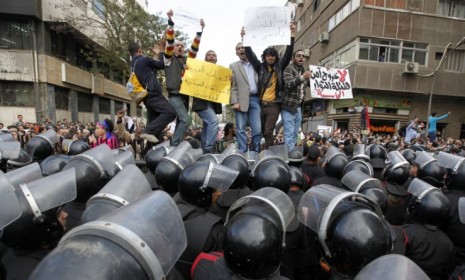4 reasons to view Egypt's Islamists without fear
Religious parties overwhelmingly dominate the country's new parliament — but the West shouldn't panic quite yet

A free daily email with the biggest news stories of the day – and the best features from TheWeek.com
You are now subscribed
Your newsletter sign-up was successful
Egypt's new parliament convened Monday after the country's first elections since Arab Spring protests ousted longtime leader Hosni Mubarak last February. Election authorities announced over the weekend that Islamist parties had won nearly three-quarters of parliament's seats. Secular liberals worry that religious lawmakers will use their dominance to curtail freedoms when legislators write a new constitution. Is the new Egypt really something to be feared? Here, four reasons the Islamists might not be as dangerous as their rivals think:
1. The religious parties themselves are divided
Egypt's Islamists hardly speak with one voice, says the Eurasia Group at Foreign Policy. In the new parliament, the Muslim Brotherhood has 47 percent of the seats in the lower house, while the ultra-conservative Al-Nour Party has 25 percent. The two groups have "different, often competing, visions of Egypt's future," so they're unlikely to collaborate. The Brotherhood says it will make fixing the economy a priority, and won't impose religious rules. The Nour party, on the other hand, is "fundamentalist and more radical." I have to admit, says Andrew Stuttaford at National Review: The in-fighting does offer a "glimmer of hope, however faint."
The Week
Escape your echo chamber. Get the facts behind the news, plus analysis from multiple perspectives.

Sign up for The Week's Free Newsletters
From our morning news briefing to a weekly Good News Newsletter, get the best of The Week delivered directly to your inbox.
From our morning news briefing to a weekly Good News Newsletter, get the best of The Week delivered directly to your inbox.
2. The military is still in charge
"The military, which took over when Mubarak was ousted, holds ultimate power for at least six more months," says the Associated Press. And as the promised transition to democracy continues, "the Brotherhood and ruling generals are expected to jostle and cajole each other over dividing power — with the Brotherhood "wary of moves that could cause a clash." Plus, the consensus among experts in Egyptian politics is that "the army will not fully abandon politics," says Marwa Awad at Reuters. Indeed, while Islamists may control Egypt's parliament, says Lisa Goldman at +972, for now, at least, it's a "rubber-stamp" body. The real power is held by the military.
3. Liberal parties will (slowly) gain influence
The coalition of liberal groups that spearheaded the protests went into the election campaign with "no financial support from foreign governments, no long-established parties, and no candidates with face recognition," says Goldman. "They had five months to prepare for elections — to form parties from scratch, choose candidates, articulate a platform, and then go out and campaign, while the chaos of the revolution continued." Despite these Herculean challenges, they won 30 percent of the vote. Given the headstart the Brotherhood and other Islamists had, I bet liberals can gain ground as the "messy, protracted" revolution continues.
A free daily email with the biggest news stories of the day – and the best features from TheWeek.com
4. Egypt's Islamists won't seek trouble abroad
The rest of the world, especially neighboring Israel, has plenty of reason to be wary, says Goldman. But they don't need to worry about war. The Islamists "have neither the power nor the will to express their dislike by mobilizing for war." They'll have their hands full with what could be years of upheaval and violence at home, as the country's revolution presses ahead.